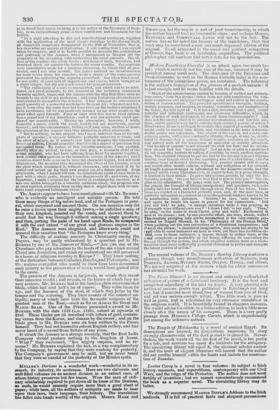Modern Fanaticism Unveiled is an attack upon too much be-
lief; which is certainly not the vice of the age, however it may he prevalent among small sects. The doctrines of the Eclectics and Predestinarians, as well as the Roman Catholic belief in the con- tinuance of the miraculous power, are combated. The following is the author's description of the process of a modern miracle : it is just enough, and he seems familiar with the details.
"Much of the astonishment excited by hearing of sudden and miracu- lous cures, done in a corner,' arises from not duly considering the inti- mate connexion and reciprocal actings of mind and matter in the consti- tution of human nature. The powerful operations of thoughts, feelings, wishes, purposes, and resolves, in rousing, stimulating, and strengthening the frame, are lost sight of. Is it not a fact, however, that a man, under suitable and sufficient excitement, can overcome difficulties, which, in the absence of such excitement, he would deem insurmountable ? And does not the energy elicited by peculiar circumstances, and forcible mo- tives, enable persons very far to outstrip their ordinary powers of action ? Observation alone is sufficient to confirm this general proposition, which might easily be carried into detail, and exhibited in its more transcen- dental modes and influences. The subject of the cure is, not a cold, cal- culating genius, with a frame naturally athletic, though, it may be, debili- tated by disease—but a young, delicate female, reclining on the couch, and nursed with all the tenderness of maternal or sisterly attention. The breath of heaven' is not allowed to visit her face,' lest its saluta- tion should bail her too roughly.' Not an ache or pain is complained of, but sympathy hastens to relieve, if possible, by some medical applica- tion. The slightest attempt to put her feet to the ground is found imprac- ticable, even though aided by the encircling arm of a kind father, and the assisting hand of devoted friendship. The pensive invalid still droops; and month after month rolls on, without any mitigation of her ailment. At length a pious stranger is introduced to the domestic circle, and the interest which every Christian feels, or ought to feel, in a pious stranger, is kindled in their minds. In grave and solemn accents, he asks the in- teresting patient, Do you believe that God is able to heal you ? ' She re- plies in the affirmative. He prays with her. The pointed interrogation, the prayer, the thought of Divine omnipotence and goodness, rush con-
jointly into her heart, and thrill through every fibre of her frame. Emo- tions are excited of a character perfectly pure, and, at the same time, as
. perfectly influential as passions of a less unequivocal kind are known to be
in numberless daily instances. Believe,' he says, 'only believe and again he bends his knees in prayer for her restoration. • Did you not feel,' he asks, 'a strange sensation while I was praying, as if strength were diffused over you?' ' I think I did,' is her reply. Then,' he adds, in the name of Jesus Christ, arise and walk.' Excitement is now at its climax ; and, by one powerful effort, she rises, stands, walks! This resolute plunging into active locomotion is the very remedy pre. scribed by Dugald Stewart, in his 'Philosophy of the Human Mind,' when pointing out the best correctives of a disordered imagination; and though the phrase, 'a disordered imagination,' may seem too strong to be r ppli able to some instances we have in view, yet there has doubtless ex- 'sted, even in those instances, a degree, though in milder form, of the si me complaint—a morbidity of the fancy, diffusing its enervating in. flounce through the system, and which required nothing more as a coun- teractive than some sufficiently powerful stimulant to revive and energize the latent powers of action."


























 Previous page
Previous page